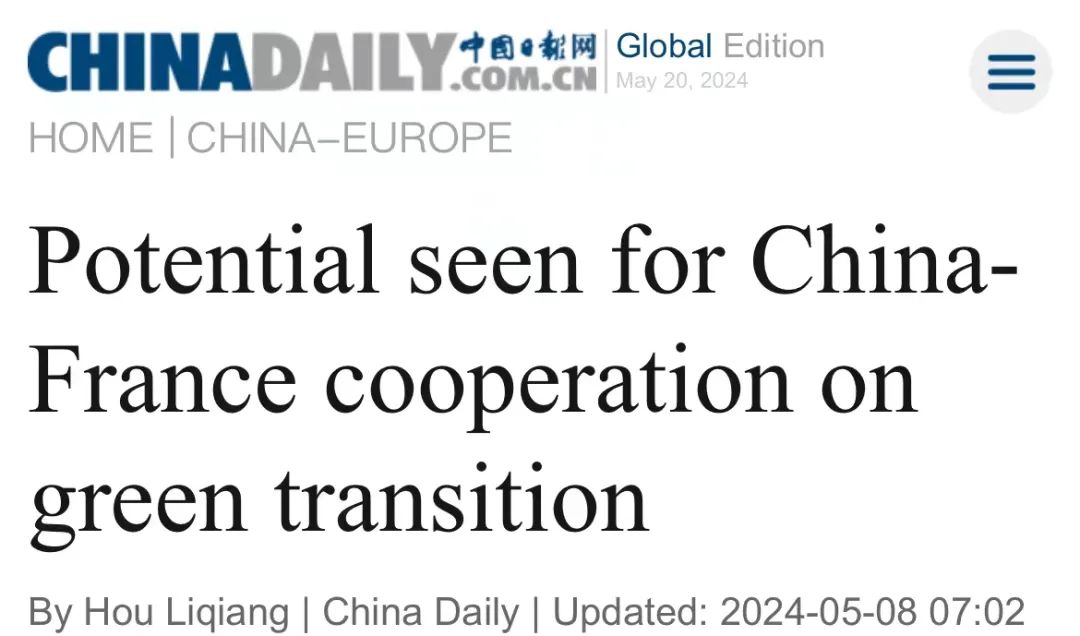王彬彬 | 中法气候合作成果丰硕潜力巨大
编者按
今年是中法建交60周年。60年来,中法通过互利合作实现共同发展、通过平等交流促进文明互鉴、通过多边协调携手应对全球性挑战。特别是在应对气候变化领域,中法两国合作促成《巴黎协定》,有力推进了全球气候议程。日前,我院王彬彬副研究员接受《中国日报》采访,就中法两国在推动全球气候治理中的历史角色、中法应对气候变化合作的重要性及合作潜力发表观点。
China Daily
原文链接:
https://global.chinadaily.com.cn/a/202405/08/WS663ab30ca31082fc043c5c64.html

China and France, with long, pragmatic and fruitful climate cooperation, have great potential for jointly improving climate governance and promoting green transition in other countries, experts said.
Wang Binbin, associate research professor at the Institute of Carbon Neutrality, Peking University, noted a solid foundation for Sino-French climate cooperation.
As early as November 2007, the two countries had issued a joint statement on addressing climate change, said Wang, a Yale World Fellow. The joint statement is the first of its kind issued between China and another country.
To strengthen climate cooperation, they decided to establish a partnership under the framework of the China-France comprehensive strategic partnership, taking a series of initiatives thereafter, she said.
Sino-French climate cooperation involves areas related to climate change, such as biodiversity conservation and desertification control, and they also make efforts to jointly promote technological development and innovative collaboration, she said.
It is evident they have designed their cooperative efforts within the framework of the United Nations Sustainable Development Goals, Wang said, adding there is enormous potential for expanding the scope of cooperation.
"China and France have always worked hand in hand, sending positive signals to the international community on climate governance, providing rare constants in a changing world, and encouraging the willingness and actions of other countries to actively respond," she stated.

A staff member works at an industrial park in the Sino-French Wuhan Ecological Demonstration City in Central China's Hubei province on March 19. WU ZHIZUN/XINHUA
Hu Bin, director of research on global climate governance at the Institute of Climate Change and Sustainable Development of Tsinghua University, said that as upholders of climate multilateralism and long-term partners in addressing climate change, China and France have played important roles in the establishment of the 2015 Paris Agreement on climate change.
During the crucial countdown period of the COP21 United Nations climate change conference in Paris, during which the treaty was adopted, China and France issued a joint presidential statement on climate change in November 2015.
In the statement, the two sides established a common ground on all major issues related to the negotiation of the treaty, including the principle of common responsibilities and the long-term goals, he said.
Hu highlighted the special contribution of the two countries in coming up with a mechanism for the long-term, sustainable implementation of the climate treaty, which allows countries to set their contribution targets.
For over a year leading up to the Paris UN climate gathering, Xie Zhenhua, who then steered China's climate diplomacy, held more than 20 rounds of consultations with COP21 president Laurent Fabius, Hu said.
Close communication
During the Paris conference, they maintained close communication, he said. The duo met almost every day to discuss the differences that emerged during negotiations and strive to maximize convergence among countries.
"They played crucial roles in landing consensus on the final negotiation text," he said.
Li Zheng, president of the Institute of Climate Change and Sustainable Development at Tsinghua University, said that through positive dialogue and cooperation, China and France made great contributions to addressing difficulties emerging in implementing the Paris Agreement.
Since 2018, China and France have issued "three joint declarations and one initiative", all of which have emphasized cooperation in addressing climate change, he said. These documents have provided guidance for the continuous advancement of Sino-French and Sino-European climate cooperation, as well as global climate governance.
Noting significant complementarity in technology and markets between the two countries, Li said the two countries can further enhance policy dialogue and pragmatic cooperation in many sectors, including carbon markets and circular economy.
He said the two countries can also help accelerate the world's green, low-carbon transition and innovation by rolling out cooperation programs in other countries.
Fang Li, country director of the World Resources Institute China, said all the joint statements China and France have issued have consistently emphasized the importance of cooperation in addressing climate change.
"The proportion of environmental content, such as climate change and biodiversity conservation, in these documents has been steadily increasing," she said. "In the joint statement of 2018, environmental content accounted for 5 out of the 27 items, which is less than 20 percent in proportion, while in 2019 and 2023, the proportion exceeded 40 percent."
She said the two countries can potentially make even greater contributions to global sustainable development by joining hands to upgrade climate governance mechanisms in the post-Paris Agreement era and promote green financing.

